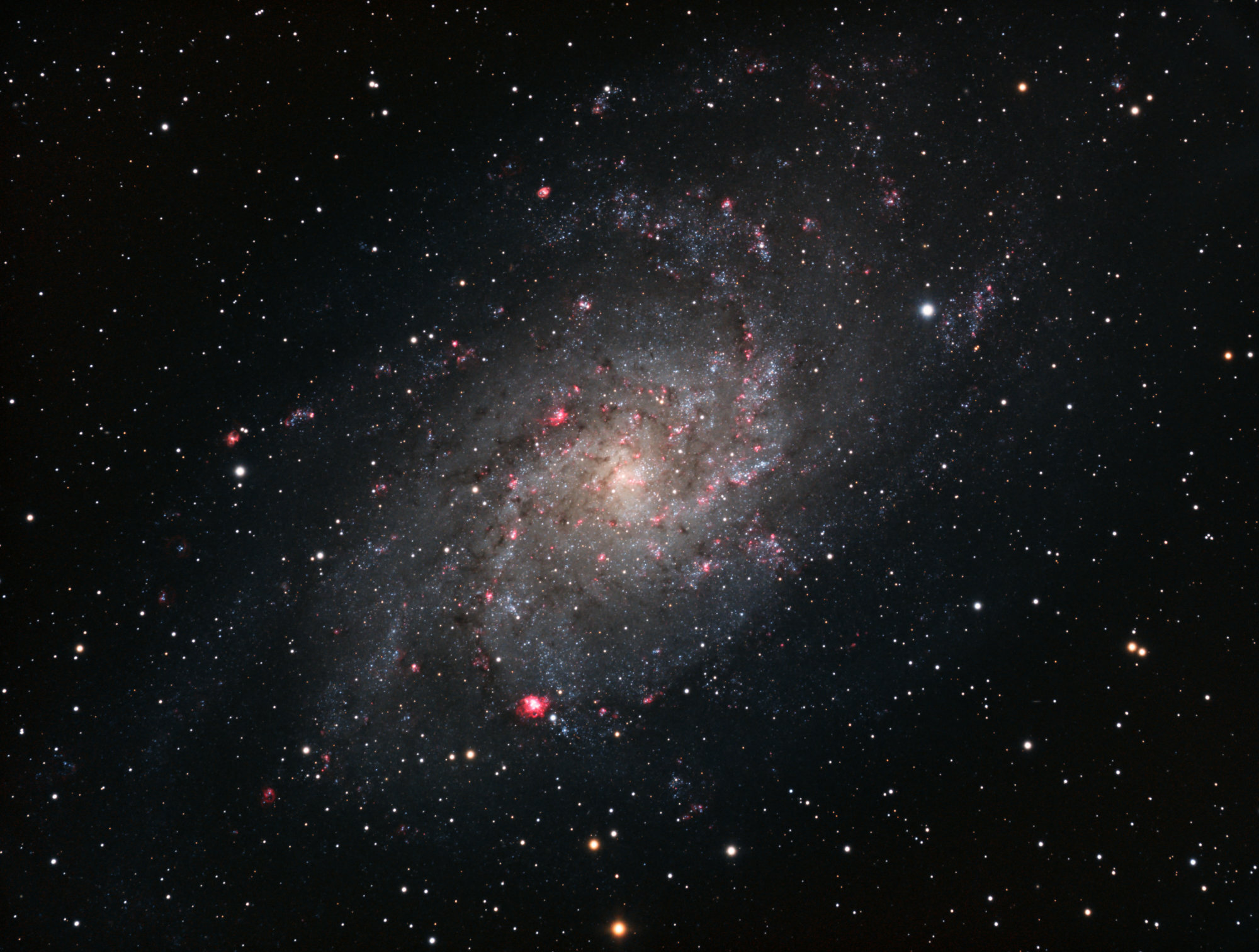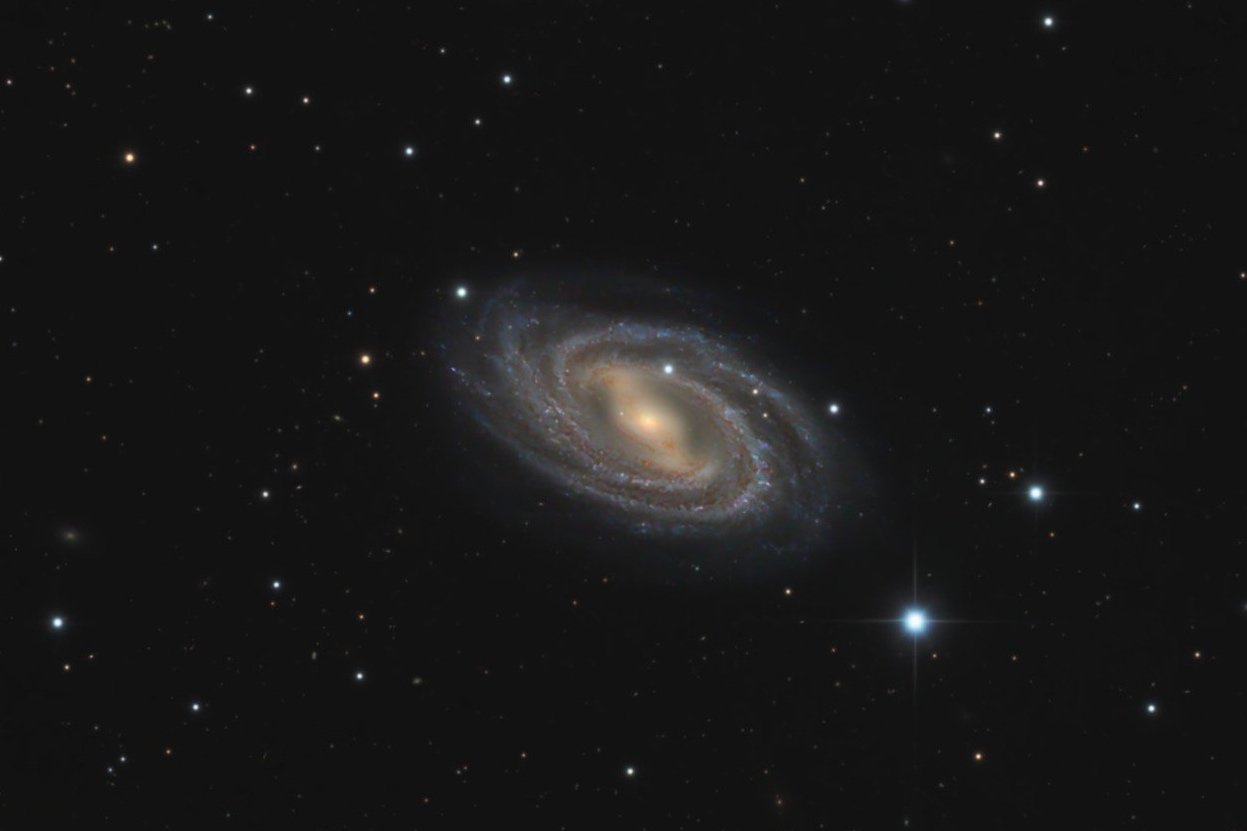
Images
Galactic objects and solar system elements in the form of final images.
Use the filter section on the right to select the objects of interest
Partial Solar Eclipse 2025
On 29 March 2025, a partial solar eclipse was visible from the West of Europe and the East of North America. From Groningen, a maximum coverage of about 25% was reached around mid-day. While clouds prevented a continuous experience, some nice images and even a full timelapse of the event was created.
Sun (21 March 2025)
Solar imaging has been in the works for a long time now. But I’m now far enough with my setup that I can actually make decent solar images. See here the first result with both a full disk image and a close-up of a prominence. Both images are also processed as timelapse video. A lot of room for improvement, but off to a good start.
M53
Messier 53 is a globular cluster located in the constellation Coma Berenices. It is one of the most distant globular clusters associated with the Milky Way, lying approximately 58,000 light-years from Earth. M53 is often observed alongside its neighbouring globular cluster, NGC 5053, which lies nearby in the sky.
M67
Messier 67 is an open star cluster located in the constellation Cancer. It is one of the oldest known open clusters, with an estimated age of around 4 billion years, making it significantly older than most other open clusters in the Milky Way. M67 is situated approximately 2,700 light-years from Earth and contains over 500 stars, many of which are similar in age and composition to the Sun.
Sh2-230
Sh2-230 is an H II region in the constellation Auriga, approximately 6,800-9,800 light-years from Earth. The nebula spans 16–26 light-years in diameter. The large region known as Sh2-230, but within this region, there are many more, often better known objects, such as M36, M38, Sh2-229, Sh2-234 and Sh2-236 ad Sh2-237.
M109
Messier 109 is a barred spiral galaxy located in the constellation Ursa Major, approximately 83.5 million light-years from Earth. It is one of the brightest galaxies in the Ursa Major Cluster. M109 is notable for its prominent central bar structure. The galaxy has a magnitude of about 9.8. It spans roughly 180,000 light-years in diameter, making it slightly larger than the Milky Way.
Arp41
Arp 41 is a grand design spiral galaxy located in the constellation Eridanus, approximately 60 to 65 million light-years away from Earth. It is part of Halton Arp's Atlas of Peculiar Galaxies, a catalog of unusual and distinctive galaxies. It includes a smaller, irregular companion galaxy, NGC 1232A, which appears to be interacting gravitationally with the main galaxy.
Caldwell 2
Caldwell 2, also known as NGC 40 or the Bow-Tie Nebula, is a planetary nebula located in the constellation Cepheus. The nebula is approximately 3,500 light-years away from Earth. It is a very small object, with an apparent diameter of only 0.9 arcmin.
Caldwell 48
Caldwell 48, also known as NGC2775, is a spiral galaxy located in the constellation Cancer. It is a so-called flocculent spiral galaxy, meaning the arms are patchy and discontinuous, giving them a fluffy or woolly appearance.
M48
Messier 48 is an open star cluster in the constellation Hydra, the Water Snake. The cluster is situated approximately 1,500 light-years from Earth, making it one of the clusters closest to our solar system. M48 contains roughly 80 stars, most of which are young, hot, blue-white main-sequence stars.
Caldwell 23
Caldwell 23, also known as NGC 891, is a spiral galaxy located approximately 30 light-years away in the constellation Andromeda. Its striking edge-on appearance has given it the nickname Silver Sliver galaxy. The galaxy is very similar in structure to our own Milky Way.
M37
M37 is the brightest open cluster in the constellation of Auriga. Many of its 500 stars are fairly young bright blue stars, but the big star in the center (HD39183) is a yellow giant. M37 is photographed here during two consecutive full moon periods in December 2024 and January 2025 respectively.
Caldwell 56
Caldwell 56, also known as NGC246, is a planetary nebula in the constellation Cetus. The characteristic shape of the bright outer shell has given it its nickname Skull Nebula. It is photographed here as an HOO image. The central white dwarf is resolved from its companion.
IC4954 and IC4955
IC4954 and IC4955 are two very small nebulae in the constellation Vulpecula. The total field of view of this image is only 12 x 9 arcmin, so very much zoomed in on an already long focal length telescope. Each night only 0.5-1.5h of data could be collected, so this image is the result of 20 imaging sessions.
Sh2-200
Sh2-200 is a very dim planetary nebula in the constellation of Cassiopeia. By mistake it ended up in the Sharpless catalogue of HII emission regions, but recently its identity as a planetary nebula was confirmed. The nebula itself and especially the hydrogen regions around it are very dim, so require long exposure times
IC-434 - Horsehead Nebula
IC434 is better known as the horse-head nebula and one of the most well-known nebulae at the night sky. The image here contains just over 2h of exposure, taken using a travel rig during a trip to Scotland. Updates to the travel rig had been applied, the most notable being that it is now run using Stellarmate on an iPad mini.




















